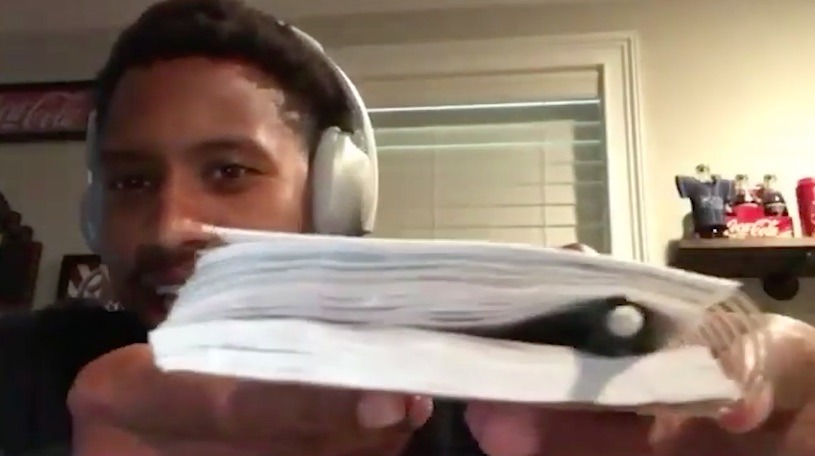© 2026 ALLCITY Network Inc.
All rights reserved.

DENVER — “Adapt or die.”
First theorized by Charles Darwin in “The Origin of Species” and made famous again in sports and pop culture by the 2011 film adaptation of “Moneyball,” these three words define an offseason altered and torn asunder in ways foreign to the modern NFL.
Figure out how to maximize OTAs that are “virtual” in nature, or suffer the consequences when games actually take place.
Wide receiver Courtland Sutton and the rest of the Broncos offense have a bulbous set of challenges in front of them without on-field practices. They can’t get together and work on their timing in new offensive coordinator Pat Shurmur’s scheme. Sutton and his fellow pass-catchers can’t get extra work with quarterback Drew Lock to build the timing and chemistry that is essential for an offense to maximize its potential.
The issues are exacerbated for rookie receivers Jerry Jeudy and K.J. Hamler arriving in the first two rounds. Much will be expected of them given their draft status, skill sets and the relative lack of veteran depth in the Broncos’ wide-receiver group. But now they do not have the low-to-no-contact repetitions of the spring that usually help acclimate young players to what they will face in the summer and fall when the pace and physicality increase.
“The OTAs, those reps that we’re not getting — those are quality,” Sutton said. “I think one of our coaches said something that last year, we ran 300-something plays in OTAs, and that’s 300 reps that you don’t have right now, that we don’t get.”
You can’t make up all of it.
But how do you make the most of it?
By studying and learning Shurmur’s new scheme as though your livelihood depends on it — which for some players on the fringe of the roster, it just might.
That isn’t the case for Sutton. Last year, he showed that he is on is way to being a legitimate WR1. He adapted to the extra attention thrown his way by defenses after the trade of Emmanuel Sanders and blossomed. He helped Drew Lock get comfortable by catching the then-rookie’s first two touchdown passes.
But now, he’s in school. Distance learning is learning nonetheless.
“This time has given us the chance to become students of this offense,” Sutton said, “to learn this offense as best we can so that whenever we do get to go on the field, that’s one big thing that we don’t have to worry about.”
Losing on-field work necessitated turning the emphasis towards the mental side of the game. But this is a far better use of the time than mailing it in and canceling the entire offseason, as the New Orleans Saints did.
“We can’t look at this situation and say, ‘We should be able to go out there and run routes, and since we can’t do that, this time is butchered.’ That’s not the case at all,” Sutton explained. “It’s how can we manage this time that we have, and this platform that we’ve given — how can we manage this and use this to the best of our ability?”
Then, Sutton reached down to pull out a thick notebook. A pen was stuffed strategically between two pages midway through it. The first half of the notebook showed all the telltale signs of use and reuse, the result of flipping through the pages to consult it as he learns the offense.

“This stuff — that’s the first couple of weeks of notes,” Sutton said. “There’s so much to learn. There’s so much that you can add to your game that isn’t just being on the field.”
On the defensive side, the task is less urgent. Nine of the projected starters were with the organization last year, although two of them — outside linebacker Bradley Chubb and cornerback Bryce Callahan — spent months on injured reserve.
On the defensive side, part of the solution is yanked straight from a high-school or college classroom.
“We get quizzed every day,” cornerback A.J. Bouye said. “The coaches do a good job just testing us, making sure we’re knowing not only our responsibility but the responsibility of other position whether the corner on the other side knowing the front, knowing when our safeties are doing certain calls, what it’s going to get us in and what routes they expect and what routes are going to beat us.”
Knowing those pop quizzes are coming ensures that the players study harder. Just as no one wants to be embarrassed on the field, they don’t want to have the wrong answers in Zoom conferences with everyone in their position group watching.
Bouye, for one, comes to the meetings properly prepared.
“One of the first things I do in the morning when I wake up is go over the past few installs, just always constantly keep programming it in my mind, putting myself in those situations, watching film from last year, seeing how certain guys played,” he said.
For Bouye, that means studying what the Broncos did last year — particularly how Chris Harris Jr. handled the No. 1 cornerback role that Bouye now assumes.
“When you have a corner like Chris who was here, one of the smart guys, you watch him and see how he plays certain things,” Bouye said. “I’m like, ‘OK this is what’s going to help with this call. This is what he’s seeing.’ That’s what it is right now. A lot of us are doing extra work outside of the meetings just to make sure that we’re in tune so that whenever we report back, we’re just clicking like that.”
The extra mental work will help, but it can only go so far to replace the physical work that is lost, not to return unless the calendar is shuffled to provide extra weeks of training camp.
“People see us at games and it looks so smooth,” Sutton said, “but that’s [created] over the time of practice, before we even get to camp.”
That’s something the Broncos can’t completely recover. But they’re still trying their damnedest to get the most out of what they do have, rather than moaning about what they don’t.
Comments
Share your thoughts
Join the conversation




